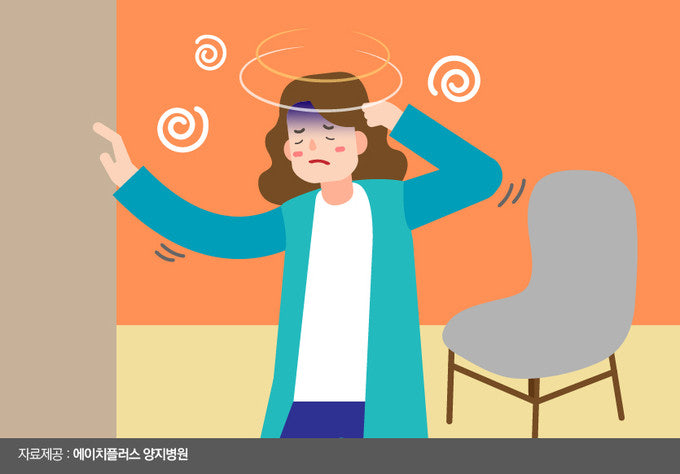누워있다가 일어날때 옆으로 구르듯이 천천히 일어나는게 좋은 습관일수 있군요 나이드니 벌떡 일어나기 힘들어 저렇게 일어나게 되었는데 ㅋㅋ 좋은정보 감사드립니다
* 站立性低血壓的六大症狀!
1. 坐下來再站起來時會頭暈目眩!2. 就算靜止不動也會感到暈眩!3. 一瞬間眼前一片漆黑!
4. 頭痛,後頸僵硬!5. 排便排尿困難!6. 嚴重時甚至會昏倒!
* 原因五種:神經系統原因、內分泌原因、心血管系統原因、藥物因素、其他原因
我有體位性低血壓。
躺著起來時前面變得一片漆黑,感到頭暈
我經常在倒下之前趕快坐下來躺下。
前幾天星期天我也很累,睡了一點像小睡的午覺,卻沒睡著。
新郎聽到孩子們大聲吵鬧的聲音,從主臥起來走出來。
因為出現直立性低血壓,趕緊坐下來並趴下了。
一段時間以來,世界不停地轉動,讓我感到多麼艱難……
說實話,幾年前我太忙了,連午餐都不吃,坐在電腦前工作了六個小時都沒起來。
完成工作後,發送了工作郵件,並大聲喊著「全部完成了!」然後站了起來
瞬間頭暈目眩,眼前一片漆黑,差點倒下,幸好趕緊抓住書桌才避免倒地。
真的那時候……哇,原來因此……有人因腦震盪而喪命啊,真是令人難過ㅠㅠ
什麼是正確的體位性低血壓呢?
直立性低血壓是指在從臥位測量血壓後,起身並在至少3分鐘內測量血壓時,收縮壓下降超過20毫米汞柱或舒張壓下降超過10毫米汞柱的情況。
我在懷孕期間,收縮壓和舒張壓雖然都屬於正常範圍,但偏低。
我坐著測量得很準確,但本來血壓就偏低,而且還有貧血的情況。
你是否聽說過比高血壓更可怕的低血壓呢?
由於體位性低血壓而跌倒受傷的事故很多,真的要特別小心。
而且……也沒有合適的藥物或治療方法。

真的有很多是適合我的……
那麼,直立性低血壓的替代原因是什麼呢?
自主神經系統在血壓調節中扮演著重要角色,如果自主神經系統出現異常,會導致體位性低血壓,進而引發貧血的症狀。
此外,由於中樞神經系統的損傷,自律神經系統的功能可能會受到影響,導致血壓調節變得困難。
帕金森氏症也會因多巴胺生成細胞的喪失而影響自主神經系統,導致直立性低血壓,並且
糖尿病神經病變等周邊神經損傷也會降低自主神經系統的功能,導致直立性低血壓。
2.內分泌原因
• 腎上腺功能低下
如果腎上腺的激素分泌不足,體液和電解質平衡會受到破壞,導致血壓下降。
• 愛迪生病
由於腎上腺皮質功能減退,皮質醇和醛固酮的分泌減少,導致體液潴留減少,血壓可能會下降。
甲狀腺功能低下症
甲狀腺激素的不足會降低新陳代謝率,影響血壓調節,因此可能會導致直立性低血壓。
我的情況不是內分泌方面的。
• 心衰竭
如果心臟無法充分泵血,站立時血壓可能會下降。
心衰患者通常血液循環不良,容易導致直立性低血壓,因此更要小心。
心律不整
心跳不規則時,血壓可能會不穩定,尤其是在心率急劇下降的情況下,可能會引發直立性低血壓。
我媽媽有時也會感到頭暈和不適,可能是因為她有心律不整的問題……
我真的要提醒您要非常小心ㅠㅠ
利尿劑
具有減少體液、降低血壓的作用,站立時血壓可能會急劇下降。服用利尿劑的患者尤其要注意體位性低血壓。
• 抗高血壓藥
降低血壓的藥物可能會導致站立時血壓急劇下降。尤其是服用多種類型的降壓藥時
據說由於情況互動,可能會導致直立性低血壓。
我媽媽有心律不整、高血壓藥……還有很多站立性低血壓的原因呢。
抗憂鬱藥及止痛藥
某些抗抑鬱藥(例如三環類抗抑鬱藥)或止痛藥(例如鴉片類藥物)會影響自主神經系統,可能引起直立性低血壓。
長時間躺著
長期躺在床上會導致下肢血液滯留,站立時血壓可能會下降。這是長期住院的醫院情況。
患者常常會出現直立性貧血。
• 老化
隨著年齡增長,自律神經系統的功能會下降,血管的彈性也會減弱,導致體位性低血壓的風險增加。
真的年紀大了為什麼這麼悲傷呢..
脫水
體液不足可能導致血壓下降。這可能由嘔吐、腹瀉、過度出汗等原因引起,尤其是在老年人中,脫水是引起體位性低血壓和站立性頭暈的原因之一。
這也是為什麼我們真的需要經常喝水的原因之一。
下半身肌肉不足
即使下肢肌肉不足,也可能因無法調節血流量而出現直立性低血壓。
據說身高較高的人,從下半身到心臟/大腦的距離也較遠,這些人也容易被注意到。
我覺得我可能也屬於這個範疇……
直立性低血壓沒有特定的藥物,也沒有特定的治療方法,只能盡量小心謹慎。
站立性低血壓的預防方法!我們來了解一下吧?
長時間坐著時要小心不要突然站起來,躺著時也要小心,起身時要像側身滾動一樣慢慢站起來。
前幾天我像你一樣突然站起來時會因體位性低血壓感到頭暈和嘔吐症狀,真的非常辛苦呢.. ㅠㅠ
而且經常做伸展運動,穿著壓力襪以防止腿部靜脈血液淤積也有幫助呢。
此外,攝取富含維生素A和C的水果和蔬菜,
多喝水,並且富含維生素E的杏仁也被認為有幫助。
大蒜也被認為含有斯科爾迪寧成分,有助於改善低血壓。
建議參考人參、胡蘿蔔、起司、菠菜和香蕉,它們都有助於改善血液流動。
而且如前所述,若下肢肌肉不足,則較難站起來。
建議透過深蹲、步行、騎自行車、爬樓梯等運動來增強下半身肌肉,讓下半身肌肉更強壯~
我已告知您體位性低血壓的症狀、原因以及預防方法。